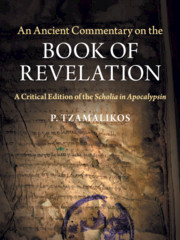Book contents
- Frontmatter
- Contents
- Preface
- Exordium
- Abbreviations
- Introduction
- Part I Text of Revelation and Scholia in Apocalypsin
- Part II Expanded Notes to the Scholia
- Bibliography
- Index of authors cited in the scholia
- Index of Names in the Scholia
- Index of terms in the scholia
- Biblical citations in the scholia
- Index of modern authors
- General index
Preface
Published online by Cambridge University Press: 05 August 2014
- Frontmatter
- Contents
- Preface
- Exordium
- Abbreviations
- Introduction
- Part I Text of Revelation and Scholia in Apocalypsin
- Part II Expanded Notes to the Scholia
- Bibliography
- Index of authors cited in the scholia
- Index of Names in the Scholia
- Index of terms in the scholia
- Biblical citations in the scholia
- Index of modern authors
- General index
Summary
Preface
When I set out to do this research, I never imagined that in order for this book to be published, two books had to be written to support its results. These books were published a short while before the present volume. They are, as it were, its siblings and the two pedestals that make it possible to establish definitively the authorship of the Scholia in Apocalypsin, which Adolf Harnack attributed hastily, and erroneously, to Origen a century ago. Codex 573, of the Meteora monastery of Metamorphosis (the Great Meteoron) was discovered in 1908, and it is the sole manuscript that preserves these Scholia. Harnack received them from a Greek theologian in July 1911, and it took him only a couple of months to determine that their author was Origen. It was a time when German authorities of the day pronounced their oracles, and everyone had to comply unquestioningly (as happens today, when they teach the rest of Europe lessons of economic decorum and of the proper organization of life). But Harnack’s research was quite inadequate: it ignored philosophical sources altogether, and sought to detect ‘similar words’ in Origen in order to establish that this was a work of the Alexandrian, while considering too small a number of early Christian theologians. For all the presumed weight of his authority, however, never did this attribution enjoy unanimous acceptance by scholars. As a result, this document, which is pregnant with information about early Christianity as well as about the exigencies of sixth-century life, remained an ‘orphan’, of which scholarship made nothing.
As early as 1986, and then in 1991, in The Concept of Time in Origen, I wrote: ‘As regards other works of Origen, we have reservations about the authenticity of the Scholia in Apocalypsin. Not so much because there is not any testimony that he ever wrote any comment on the Apocalypse; but because to anyone who is familiar with his thousands of pages in Greek, this text seems unlike him and alien to his style. We have no reason to make this point one of dispute whatever. For, as far as our topic is concerned, of what is stated in that work there is nothing to appeal to, or to dispute.’
- Type
- Chapter
- Information
- An Ancient Commentary on the Book of RevelationA Critical Edition of the Scholia in Apocalypsin, pp. ix - xiPublisher: Cambridge University PressPrint publication year: 2013

